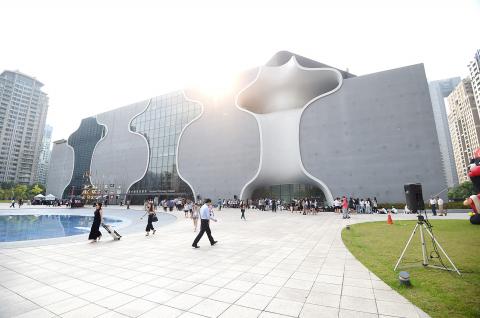The Taichung Metropolitan Opera House, which is to open on Sept. 30, will likely run a considerable deficit, the National Audit Office said, drawing the ire of city officials.
The Taichung City Government on Thursday last week donated the National Taichung Theater (Metropolitan Opera House) — designed by Pritzker Architecture Prize-winning Japanese architect Toyo Ito — to the Ministry of Culture.
The theater is likely to operate at an annual deficit of NT$150 million (US$4.7 million), the office said in a report and made suggestions for improving the theater’s operations.

Photo: Liao Yao-tung, Taipei Times
The report was based on last year’s assessment of the theater’s financial plan. It suggested that the theater completely overhaul its financial plan to improve the use of resources, adding that only 21 international performances are planned for this year.
The office said that the quality of performances should also be improved to appeal to a broader audience.
The ministry separately anticipated an annual loss of NT$200 million for the theater.
Democratic Progressive Party Taichung city councilors Chiang Chao-kuo (江肇國) and Yang Tien-chung (楊典忠) said the arts are not meant to be business endeavors, calling the office’s report “unbelievable.”
“The nation should be investing more resources to promote education in the arts. The National Audit Office views the government’s responsibility in promoting the arts as just running a business: They only pay attention to profits and losses. This is a narrow-minded approach,” Chiang said.
“The government should be thinking about how to use the resources at hand to develop the arts at a level appropriate for the population of central Taiwan,” Chiang said.
“And this is to say nothing of the superior quality of the facilities at the theater. The Ministry of Culture and the Taichung City Government should be thinking about how to positively develop soft resources,” Chiang added.
The office on one hand says that the financial losses by the theater will be a drain on the treasury, while on the other, it says that the number of international performances is too low, Yang said.
International performances are big expenditures and the office’s comments lead to a confusing situation in which it seems it is “wrong to spend money and wrong to save money,” he said.
He said he hopes that the office will not elevate arts in “Taipei while looking down on central and southern Taiwan.”
The theater is an official center for the performing arts and operates according to public policy, the theater’s vice supervisor for promotional affairs Lin Chia-feng (林佳鋒) said, adding that the policy comprises more than just selling tickets.
The Taipei National Theater and Concert Hall operated for more than 20 years before turning a profit, he said.
“Those outside of the arts should see the function of the arts as more than earning money. Although it is a venue for the performing arts, the theater also has a mission of assisting and fostering the development of local and national performance troupes,” he said.
“Initially we were aiming for a ratio of 40 percent international performances and 60 percent domestic. Some of that would account for programs held cooperatively with international performers. It is our hope to bring recognition to Taiwanese performance troupes,” he added.

Chinese spouse and influencer Guan Guan’s (關關) residency permit has been revoked for repeatedly posting pro-China videos that threaten national security, the National Immigration Agency confirmed today. Guan Guan has said many controversial statements in her videos posted to Douyin (抖音), including “the red flag will soon be painted all over Taiwan” and “Taiwan is an inseparable part of China,” and expressing hope for expedited reunification. The agency last year received multiple reports alleging that Guan Guan had advocated for armed reunification. After verifying the reports, the agency last month issued a notice requiring her to appear and explain her actions. Guan

GIVE AND TAKE: Blood demand continues to rise each year, while fewer young donors are available due to the nation’s falling birthrate, a doctor said Blood donors can redeem points earned from donations to obtain limited edition Formosan black bear travel mugs, the Kaohsiung Blood Center said yesterday, as it announced a goal of stocking 20,000 units of blood prior to the Lunar New Year. The last month of the lunar year is National Blood Donation Month, when local centers seek to stockpile blood for use during the Lunar New Year holiday. The blood demand in southern Taiwan — including Tainan and Kaohsiung, as well as Chiayi, Pingtung, Penghu and Taitung counties — is about 2,000 units per day, the center said. The donation campaign aims to boost

The Kaohsiung Tourism Bureau audited six hotels in an effort to prevent price gouging ahead of Korean band BTS’ concert tour in the city scheduled for Nov. 19, 21 and 22 this year. The bureau on Friday said that the audits — conducted in response to allegations of unfair pricing posted on social media — found no wrongdoing. These establishments included the local branches of Chateau de Chine, Hotel Nikko, My Humble House, and Grand Hai Lai, it said, adding that the Consumer Protection Commission would have penalized price gougers had the accusations been substantiated. The bureau said the Tourism Development Act

BACK TO WINTER: A strong continental cold air mass would move south on Tuesday next week, bringing colder temperatures to northern and central Taiwan A tropical depression east of the Philippines could soon be upgraded to be the first tropical storm of this year, the Central Weather Administration (CWA) said yesterday, adding that the next cold air mass is forecast to arrive on Monday next week. CWA forecaster Cheng Jie-ren (鄭傑仁) said the first tropical depression of this year is over waters east of the Philippines, about 1,867km southeast of Oluanpi (鵝鑾鼻), and could strengthen into Tropical Storm Nokaen by early today. The system is moving slowly from northwest to north, and is expected to remain east of the Philippines with little chance of affecting Taiwan,